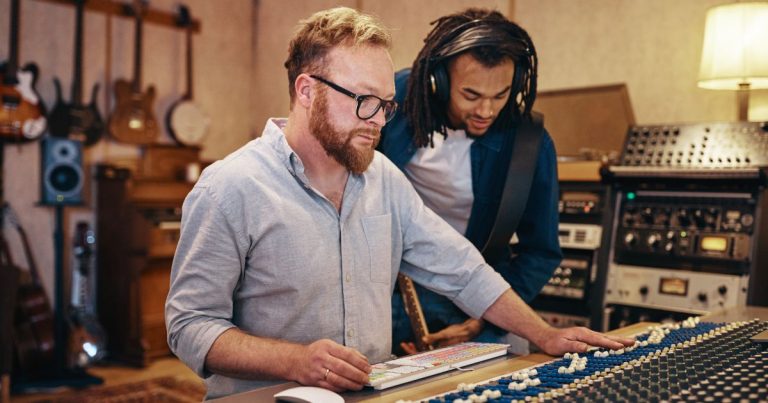With record labels investing less and less in artist development, the role of singing teacher as mentor is more important than ever.
In 1980 super producer Chris Blackwell heard a bunch of Irish upstarts play in a south London pub and was totally underwhelmed.
He thought the lead singer’s voice was weak and the band’s music “rinky dink”.
So what did he do? He signed the group to his label Island Records.
Why?
Blackwell thought the band had swagger. He liked their manager and believed that, with time and support, the group could develop into something special.
It took seven years and five albums for that band – U2 – to break through as international superstars, but Blackwell and Island Records stuck by them all the way.
Succeeding in the music world today
The story of U2’s rise to success sharply contrasts with how most emerging artists get their start these days.
Record labels now tend to step in much later down the line when an artist already has a body of work to their name and an established fan following.
This means that at the start of their careers performers need to do much of the artistic and marketing legwork themselves to get noticed. Multi-tasking is the order of the day, and can include writing and producing music, building a social media following and organising gigs and tours.
As Elliot O’Connor, who heads up an indie label in LA, explains: “Advocating for yourself is a huge thing.
“My advice [for emerging artists] is stop trying to hurry the process of somebody from a label coming and signing you. You must be prepared to make some noise yourself before anybody wants to get involved.”
The role of the singing teacher
Developing your artistic identity and navigating the business side of the industry is tough, especially if you have zero connections and live outside of a major music capital.
For singers in this position, their first mentor and champion will often be their singing teacher.
“The relationship between a student and a voice coach is a special one,” Elliot says. “The first line of defence for a young artist is often the voice teacher.”
While this relationship can be rewarding for both parties, for the vocal coach, it also comes with responsibilities.
“As a voice coach, you have to wear many different hats,” Elliot says. “You want to help that person succeed because you’ve been working with them for a long time.
“And the last thing you want to do is suggest your student, who you care for deeply and feel very protective of, goes down the wrong path. We’ve all heard horror stories of people in the music industry taking advantage of others.”
So how can vocal coaches develop the knowledge and skills to confidently foster emerging talent?
VocalizeU
If you’re keen to take a deep dive into the music business and fancy spending 10 days in sunny California in July, one option is VocalizeU.
Elliot and his friend and colleague Billy Clark, a former record industry A&R man who now works in artist management, are the driving forces behind the programme.
It offers a 360° music education covering performance, identity, production, songwriting, and management.
VocalizeU is open to developing artists, producers, vocal coaches and anyone else working in the music industry.
And while you’re guaranteed to take a lot in during the 10-day programme, Elliot and Billy are keen to stress that the learning doesn’t stop there.
The pair stay in touch with attendees throughout the year and are happy to act as a sounding board for those seeking advice or introductions.
“We want to make sure that voice teachers don’t lose any of their students because of their lack of industry knowledge or relationships.
“What we’re trying to do is offer community, support and a network of trusted people.”
Learn more
If you’d like to know more about artist development and the VocalizeU programme, listen to this episode of the Singing Teachers Talk podcast. Stay tuned until the end to hear the great VocalizeU special offer for Singing Teachers Talk listeners.




